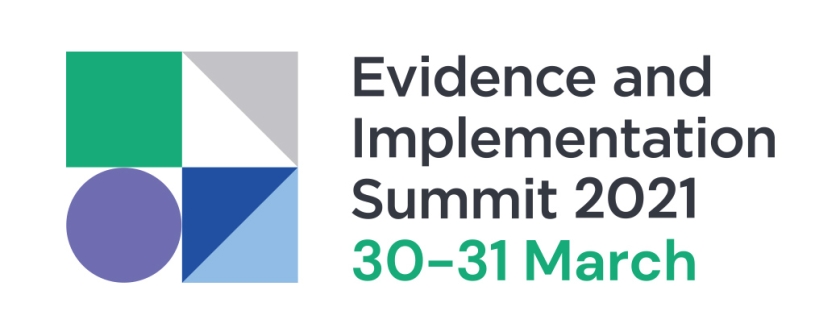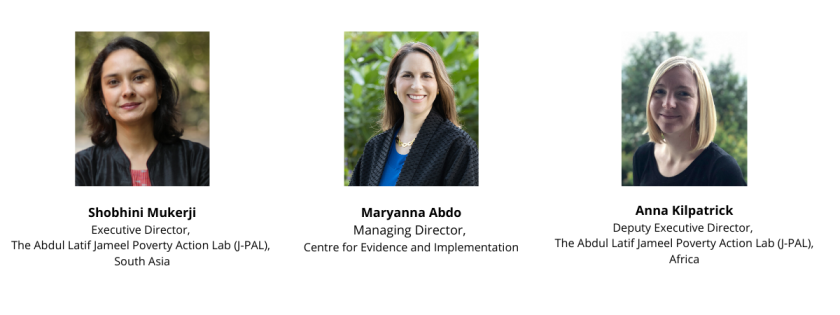CEI’s journey through 2020 has been marked by unforeseen changes in the way we and our partners operate. These adjustments have also presented our organisation with opportunities for innovation in the way we work with the communities we serve. The appetite for good evidence is – if anything – increasing, as tighter budgets and complex social challenges put a premium on knowing what works.
In this month's newsletter we share some of CEI’s recent undertakings, with highlights from the new Evidence and Implementation Summit Virtual Series, behavioural and implementation science insights for the COVID era, and examples of our work on projects and programs that use good evidence and effective implementation to support those who need it most. Along with our co-hosts Monash University, we are also pleased to announce the move to a hybrid program for the Evidence and Implementation Summit 2021.
EIS2021 goes global!
Abstracts now close 6 October 2020
The Centre for Evidence and Implementation and Monash University are delighted to announce the move to a hybrid program for the Evidence and Implementation Summit 2021. This will enable the Summit to host presentations from a wide network of global contributors who may otherwise be unable to attend due to travel restrictions or health concerns.
The review panel is currently receiving abstracts for presentations, panels, and posters and the abstract submission deadline is now October 6. Details regarding further additions to the program format and abstract submissions are available on the EIS2021 website.

Join webinar with J-PAL on 15 July
In the lead up to EIS2021, CEI and Monash University are hosting the EIS Virtual Series enabling a global audience to hear from leaders in the field. The next webinar, Perspectives on robust evidence and effective implementation from the global South: a conversation with J-PAL, will feature members of The Abdul Latif Jameel Poverty Action Lab (J-PAL) leadership team. In 2019 J-PAL founders and collaborators won the Nobel Prize in Economics. The organisation is recognised as one of the world's foremost research institutions working to reduce global poverty by providing policymakers with clear scientific evidence on what works (register at the link below).
The May webinar featured co-editors of the recently published Implementation Science 3.0, Dr Robyn Mildon, Dr Aron Shlonsky and Dr Bianca Albers. They discussed two decades of impressive growth in the field but noted we are still some way from successfully 'implementing' implementation. A recording is available here.
June's webinar featured a conversation with Dr Geoffrey Curran, a pioneer in hybrid design. The session explored the methods and design landscape, looking broadly at the importance of innovation, experimentation and methods, and at hybrid designs in particular. The recording, which includes Dr Curran's slides, can be accessed here.
Perspectives on robust evidence and effective implementation from the global South: a conversation with J-PAL will be held at 5pm AEST July 15:

Working with Wellcome Trust for a radical transformation of mental health science
CEI is one of a select number of teams worldwide commissioned by the UK-based Wellcome Trust to explore which interventions work best for young people with anxiety and depression. The recently announced commission is part of Wellcome’s innovative new mental health strategy. Its intention is a radical transformation of mental health science to learn what really makes a difference.
Policymaking in a pandemic
We are currently in the early stages of the COVID-19 pandemic, and policymakers the world over are still reacting to the immediate crisis. What measures will be appropriate longer term for those grappling with how to adapt policymaking in the post-COVID landscape? There are rich global examples of how implementation science and behavioural science can inform approaches to influence behaviour and reshape systems. In the June edition of Ethos, a publication of the Civil Service College Singapore, CEI’s Managing Director Mary Abdo, Director for UK and Europe Jane Lewis, and Executive Director Dr Robyn Mildon explore useful approaches for policymakers in a post-COVID world.
Keep SAFE: behavioural vaccines - cheap, effective and available now
In the June edition of MJA Insight, CEI’s Dr Jessica Hateley-Browne and co-authors draw on their collective behavioural science expertise to advance the notion of a ‘behavioural vaccine’ for COVID-19. ‘Keep SAFE’: a behavioural vaccine for COVID-19 highlights the need for good implementation of sustainable behavioural modifications to minimise and contain new outbreaks whilst we wait for a proven medical vaccine.
Evaluation of Health Innovation Zone initiative in Latrobe Valley
CEI is working with Latrobe Community Health Service, in collaboration with the Latrobe Health Assembly, as well as the Victoria Department of Health and Human Services and Department of Education and Training, to conduct an evaluation of a Community Health Nurse in Schools program within the Latrobe Valley Health Innovation Zone. The program has been running since mid-2017 and is now operating across eight primary schools in the region. It recognises that children’s health, wellbeing and opportunity to thrive are inextricably linked with their attendance at school.
Formative evaluation of a skilling program for special needs youth
Presbyterian Community Services, a social service agency in Singapore, has engaged CEI to conduct a formative evaluation of their EduCarer Aide Training (ECAT) project. ECAT is a capacity and capability building initiative that seeks to enable youth with special needs to become competent EduCarer Aides (similar to preschool teachers’ aides) in preschool settings. There are early indications the project has national scale-up potential.
Preventing at-risk young people from entering the criminal justice system
CEI is working in partnership with Save the Children Australia and the Youth Partnership Project (YPP) to develop an evidence-based practice framework for the Youth Early Intervention project. The aim of this project is to prevent at-risk young people from entering the criminal justice system by delivering holistic support to children and families experiencing complex disadvantage.